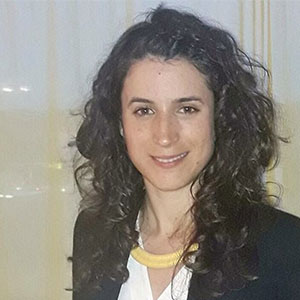Dr Julia Ramirez

Honorary Lecturer in Cardiovascular Data Science and Genetics
Centre: Clinical Pharmacology and Precision Medicine
Email: j.ramirez@qmul.ac.uk
Telephone: +44(0) 20 7882 2101
Website: https://juliaramirez.net
Twitter: @Ju_Ra_Ga
Profile
I received a M.Sc. degree in Telecommunications Engineering from the University of Zaragoza, Spain, in 2011, followed by a M.Sc. degree in Biomedical Engineering from the same university in 2013. I then pursued my doctoral studies to achieve a PhD in Biomedical Engineering, funded by a pre-doctoral fellowship from the University of Zaragoza and by a research contract from “Centro de Investigación Biomédica En Red – Bioingeniería, biomateriales y Nanomedicina (CIBER-BBN)”. During my PhD studies, I did two 3-months research stays funded by CIBER-BBN mobility grants, the first one at University Hospital of Zurich with Dr Laurence Jacobs and the second one at University College London with Dr Michele Orini. In March 2017, I obtained my Ph.D. in Biomedical Engineering from the University of Zaragoza, supervised by Professor Pablo Laguna and Professor Esther Pueyo in the form of an International Doctorate, achieving a summa cum laude distinction.
After finishing my PhD in March 2017, I moved to Queen Mary University of London with Professor Patricia Munroe, as a Medical Research Council postdoctoral researcher. This was a highlight in my research career, as I expanded my skillset to learn genetics and bioinformatics. In July 2017, I was awarded a WHRI-ACADEMY COFUND International Fellowship, by the Marie Curie Actions, H2020, European Commission. Then, in February 2018 I was awarded a Marie Skłodowska-Curie Individual Fellowship, also by the Marie Curie Actions, H2020, European Commission. In April 2020 I was promoted to Lecturer in Cardiovascular Data Science and is my current academic position.
Memberships
International Genetic Epidemiology Society
American Society of Human Genetics
Awards
- 2019 ESC-CinC Clinical Needs Translational Award, including a cheque (US$500 + €500) and a commemorative diploma.
- 2019 UK Biobank Early Career Competition, Top 20 abstract.
- 2019 Best of the best clinical abstract – cardiac rhythm management – Runner up, awarded at the “British Cardiovascular Society”.
- 2018 Best Poster Award – Runner up, awarded at the “A to Z of Sudden Cardiac Death Conference”. It included a £200 prize.
- 2018 ESC-CinC Clinical Needs Translational Award, including a cheque (US$500 + €500) and a commemorative diploma.
- 2018 FP7 Marie Curie Action – H2020-MSCA-IF-2017
MSCA-IF-EF-ST-786833. GENESIS: GENetics and the Electrogardiogram for predicting Scd rISk. € 183,454.8 funding for 24 months of research. - 2017 FP7 Marie Curie Action - WHRI-ACADEMY COFUND International Fellowship. PCOFUND-GA-2013-608765. Gene2TSCD: Genotype-Phenotype analysis of dynamic ECG T-wave morphology changes and their role in risk stratification of Sudden Cardiac Death. € 69,272 funding for 15 months of research.
- 2016 Michael Ringborn Young Investigator Award for the best oral presentation.
- 2016 Mortara mobility fellowship, awarded by MORTARA. It included a $2,000 prize to cover the conference costs.
- 2015 CIBER Mobility grant, awarded by the “Centro de Ingeniería Biomédica en Red”. Includes funding for a 3-month research stay.
- 2014 Michael Ringborn Young Investigator Award for the best oral presentation.
- 2014 Jos Willems Young Investigator finalist.
- 2013 Rosanna Degani Young Investigator Award for the best written and oral presentation, awarded by Computing in Cardiology conference. It included a $2.000 prize.
- 2012 Gary and Bill Sanders award for the best poster presentation, awarded by Computing in Cardiology conference. It included a $150 prize.
- 2012 CIBER Mobility grant, awarded by the “Centro de Ingeniería Biomédica en Red”. Includes funding for a 3-month research stay.
- 2011 PhD Fellowship, University of Zaragoza, Zaragoza, Spain, 2012-2013.
- 2009 ERASMUS Program undergraduate mobility fellowship, EU ERASMUS Program, 2010-2011.
- 2006 Red Leaf summer exchange fellowship, Red Leaf, 2006.